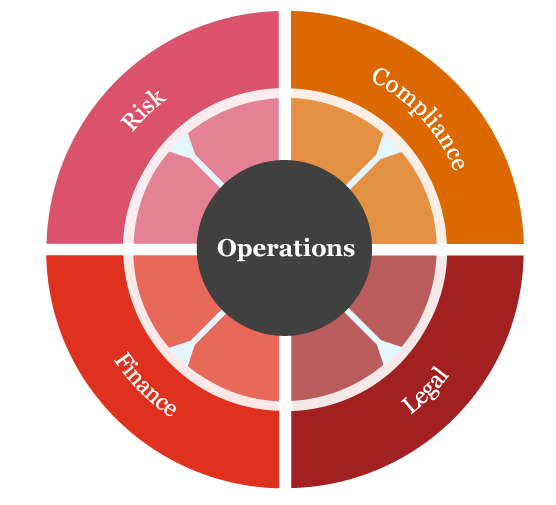Product Governance
MiFID II imposes new product governance requirements with rules that both product manufacturers and distributors must adhere to during the product lifecycle.
Manufacturers must design products appropriately, ensure investment products are consistent with the needs of identified target markets, create a distribution strategy for each product, carry out periodic product tests and assess risks and inform distributors.
Distributors have to make sure they obtain all necessary information from manufacturers on products before they’re distributed, must match products adequately to their clients’ needs and undertake regular product testing to make sure products remain consistent with the needs of the identified target market and that the distribution strategy remains appropriate.
How we can help
- Provide advice on product governance rules, perform legal assessments and help you put in place the necessary compliance and risk management programmes for your business.
- Detect significant compliance risks (reporting duty to board) and set up a monitoring programme.
- Evaluate and optimise product approval and review processes and product governance policies.
- Review distribution strategy in view of potential changes as a result of the new governance structure under MiFID II.
- Help you assess and draft contractual documentation setting out rights and obligations for manufacturers and distributors.
- Make the connection with other regulations (e.g. PRIIPS).
Conflicts of interest and third-party inducements
Firms must try to prevent, identify and manage conflicts of interest which arise during the provision of services due to third-party payments received or paid between an investment firm and a management company or due to the firm’s remuneration structure. All actions must be properly disclosed.
Rules relating to third-party inducements impact firms offering independent advice or discretionary portfolio management services, as they’re no longer allowed to retain commission received from a third party.
Firms that offer non-independent investment advice will have to explain retained inducements through a quality enhancement test. They’re also required to comply with enhanced information disclosure requirements.
MiFID II requires that firms define and oversee a remuneration policy for all service providers to avoid conflicting situations.
How we can help
- Review your current distribution arrangements and tackle MiFID compliance and legal requirements by considering the impact of changing operating models.
- Help you draft a policy to make sure received inducements are transferred back to clients and help assess which inducements may be retained (where applicable) based on the structure laid down under MiFID II.
- Optimise policies and procedures relating to the identification and management of conflicts of interest and review existing controls framework.
- Help set up a remuneration policy which encourages responsible business conduct and organise training sessions which create awareness and facilitate the detection of conflicts by all employees.
- Help you choose the most suitable business model taking into account revenue implications (identify threats, propose opportunities). Our multi-disciplinary service approach combines legal, regulatory and compliance expertise with innovative transfer pricing and tax advice.
Best Execution
Under MiFID II, rules relating to Best Execution become stronger (i.e. take all sufficient steps to obtain best possible result when executing orders) and wider in scope (encompassing a broader range of asset types).
You will be required to annually summarise and publish your top five execution venues by trading volume (client orders) for each class of financial instrument and information will need to be provided on the quality of execution.
Trading venues and systematic internalisers (‘SI’) will need to publish information on quality of execution for certain types of financial instruments on a yearly basis.
MiFID II will require that you’re able to demonstrate compliance with the Best Execution requirements vis-à-vis clients and the national regulator upon request.
How we can help
- Help formalise the new Best Execution obligations and related data publication requirements under MiFID II.
- Ensure trading processes are compliant (i.e. voice trading).
- Consider the strategic implications of compliance with new trading requirements (i.e. the impact on capital investment and ongoing costs).
Independent investment advice
MiFID II introduces a new concept of ‘independent investment advice’ as opposed to ‘non-independent investment advice’. When opting for ‘independent’ advice, a sufficiently diverse selection of financial instruments needs to be offered and the firm will be required to retrocede inducements to clients.
Whatever type of advice is chosen, you must inform clients before a transaction takes place. If you opt for a hybrid approach (offering both independent and non-independent advice) additional organisational controls need to be in place to avoid confusion about the type of advice rendered.
For the reception or payment of commissions, fees or any other monetary or non-monetary benefit to the independent advisor, see ‘inducements’.
How we can help
-
Help you choose the most suitable business model taking into account revenue implications (identify threats, propose opportunities). Our multi-disciplinary service approach combines legal, regulatory and compliance expertise with innovative transfer pricing and tax advice.
Inform clients
You must inform clients about the costs and charges associated with advice and the financial instrument, how they must pay for this service, including third-party payments, and specify for which type of clients the financial instrument is intended. Depending on the type and complexity of the product and nature of the service provided, communication should be periodic.
Under MiFID II, the scope extends to include clients categorised as ‘eligible counterparties’ or ‘professional clients’, making the rules applicable to these clients too.
You might want to consider other upcoming information-related initiatives – such as the proposed ‘Key Investor Document’ (KID) under PRIIPS, requirements relating to Product Risk Labelling and Marketing materials under the transversal Royal Decree – in your implementation efforts undertaken under MiFID II.
How we can help
- Adapt your policies, information distribution in function of new MiFID II requirements (i.e. the drafting of documents intended for the professional clients).
- Help you increase efficiency in your implementation efforts by providing an overview of actions to undertake with particular regard to upcoming regulatory developments.
Suitability, Appropriateness and Execution Only
MiFID II will explicitly require firms providing investment advice to issue a suitability report before the transaction is made or immediately after the client has signed the contract. The report will have to specify how the advice given meets the client’s preferences, objectives and other characteristics. With regards portfolio management, the periodic report must contain an updated suitability report.
MiFID II will also narrow the scope of execution only activities, as the existing list of financial instruments for which an appropriateness test is required has broadened (extension of the list of complex financial products). This may have an impact on the operating model of investment firms based mainly on Execution Only activities.
How we can help
- Advice on suitability and Execution Only requirements laid down in MiFID II. Our close contacts with regulators means we can inform you of the most up-to-date interpretations of applicable rules.
- Help you define for which instruments you’ll be required to perform an appropriateness test. (e.g. credit facilities) and/or help you redefine complex instruments.
- Draft a suitability report or help optimise an existing report to make sure it’s in line with expectations.
- Draft the client documentation required to adhere to suitability and execution only requirements.
Competence & Skills
Under MiFID II, investment firms will have to make sure (and be able to demonstrate) that advisors, portfolio managers and product manufacturers possess the necessary competences and skills to fulfil their activities.
Accordingly, firms will need to identify internal key stakeholders who understand the firm and MiFID II requirements to drive internal initiatives.
How we can help
- Enhance your understanding of MiFID II via training sessions and workshops.
- Help set predefined criteria for the assessment and evaluation of your personnel.
- Cooperate in the creation of internal initiatives to make sure all relevant stakeholders possess the right knowledge.
Record keeping
To comply with MiFID II, investment firms will need to keep records of all services, activities and transactions (i.e. data constituting the characteristics of an order), including records of all telephone calls and emails which relate to client advice and orders. These records will also be intended for local regulators in the context of the supervisory activities under MiFID/MiFIR and Market Abuse Regulation (MAD/MAR).
These strengthened record keeping rules mean you’ll need to demonstrate compliance with obligations with respect to clients and around market integrity.
How we can help
- Help you comply with the organisational requirements of MiFID II rules (update policy, procedures, etc.)
- Provide training to employees to build awareness.
Enhanced trading rules
In addition to the Multilateral Trading Facility (‘MTF’) and Regulated Markets (‘RM’), Organised Trading Facilities (‘OTF’) have also been added to the scope of trading systems captured by MiFID II, meaning that all trading platforms will be subject to an appropriate degree of regulation and oversight, and must comply with rules relating to transparency, best execution and transactions reporting.
MiFID II will also introduce new requirements on cost structures (i.e. requiring them to be transparent, fair and non-discriminatory) to prevent the creation of incentives which could (potentially) contribute to disorderly trading or market abuse.
MiFID II takes into account recent evolutions in automated training by imposing additional due diligence requirements for algorithmic trading and high frequency trading.
How we can help
- Advice on details of enhanced trading rules.
- Help with obtaining an investment firm license.
- Review of your cost structure and assessment of its appropriateness.







